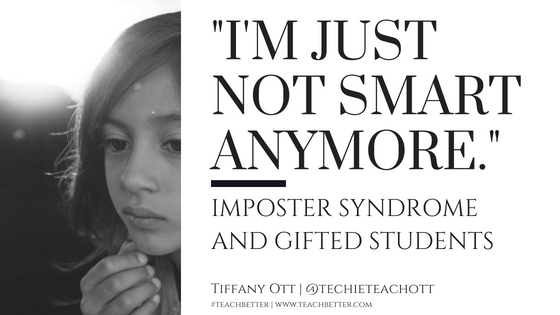Gifted students don’t have it as easy as we sometimes think.
It breaks my heart each time I hear the words, “I’m just not smart.” come out of my student’s mouths. I have worked with a wide variety of students in my years as a teacher, and I have found that one population especially is frequently prone to this- gifted students.
It may seem like being gifted is all roses and sunshine- it must be great to have academics come easily, right? Nope! This population has a whole slew of challenges unique to them that need specific solutions!
Self-doubt hits hard, and many of these students don't have the skills to cope with those emotions. Click To TweetA funny thing happens when a child has spent the first 5, 10, sometimes even 15 years of their life with anything academic coming easily to them. Very bright and capable students rarely struggle in elementary school, at least with the subject content (peer relationships can be a whole other story). Many of them breeze through middle school just fine once they figure out how to stay somewhat organized.
Imposter Syndrome
The minute something becomes challenging, however, things can start to fall apart. Gifted students are masters at cognitive leaps and connecting abstract ideas. This serves them well when developing a conceptual understanding of math, or generating hypothesis in science, but when they are faced with a situation in which they can’t figure out that cognitive leap, they often crumble. They come to believe that they are imposters (hence the name) and that their smartness was a false positive.
What follows then is a litany of, “I must not be smart anymore,” and “I don’t belong in this [honors/gifted/advanced] class.”
Self-doubt hits hard, and many of these students don’t have the skills to cope with those emotions. They never HAD to develop those skills because learning often came easily to them when they were younger!
So now what? We know what imposter syndrome is, and we have a student who is clearly struggling. How can we help?
Here are a few ideas with you that you can try if you have a student experiencing this.
1. Eliminate the mystery
Simply acknowledging the situation with the child can be powerful. Give their feelings a name: Imposter syndrome. Help them understand that their feelings are not uncommon nor are they impossible to work through. Tell them the brain science behind how they learn and develop in their early years, and how this can impact the way they are learning and developing now.
There is a great fear that happens when someone doesn’t feel right. When they feel like they are hiding the truth and are about to be exposed as an imposter. Naming these emotions, offering an outlet for them, and acknowledging that the child is not the only one who has felt that way goes a long way towards helping them work through the challenge. Sometimes, this is all that is needed for them to understand and eliminate those emotions!
[scroll down to keep reading]2. Help them realize they are not alone
Show me a room full of 100 people and I will show you 70 that have had feelings of being an imposter. It is not rare! Unfortunately for our gifted and advanced students, it often hits them earlier than the general population and they simply do not have the emotional capacity to handle it.
You can help them cope by letting them see role models and examples of other people who have felt the same way. Have you ever felt it? Share your story! Tell them how you overcame it yourself.
Here are some other examples that you can pull from to help you. They could be the start of an interesting class discussion or reflective writing piece for each student in the class.
“I have written eleven books, but each time I think, ‘Uh oh, they’re going to find out now. I’ve run a game on everybody and they’re going to find me out.” -Maya Angelou
“When I was younger, I just did it. I just acted. It was just there. So now when I receive recognition for my acting, I feel incredibly uncomfortable. I tend to turn in on myself. I feel like an impostor. It was just something I did.” -Emma Watson
“At any time, I still expect that the no-talent police will come and arrest me.” -Mike Myers
3. Find a mentor
Just like a mentor relationship can be transformative for educators, they make a huge difference in a child’s life! Seek out an adult that the student relates well to. Maybe it’s you! Maybe it is the gym teacher or the lunch aid. Whoever it is, try to set up some time for the child and the mentor to casually meet- lunch together is an awesome start! Gifted students often enjoy speaking with adults.
Don’t dictate the conversation towards the child’s feelings, simply allow the conversation to flow, as if it were two old friends talking. Having an emotional outlet can be so beneficial to these students! These kinds of relationships take a while to build and to be effective towards challenging these emotional needs of gifted students. Make sure to give it at least a couple of months with regular meetings before you determine its effectiveness!
4. Seek out additional help when you need it
These first three strategies are great places to start. But they won’t solve the problem for every single student. If you have tried these ideas and aren’t seeing a lot of progress with the student, call in the troops! Get the school counselor involved, meet with parents, seek out the help of colleagues- maybe other teachers the student has. Find a way to get the child the help they need!
Imposter syndrome is no joke, folks. It is a very real and damaging problem that many students struggle with and, left unchecked, can do real harm to a students’ self-worth. Most of them will get through it just fine with the first three strategies listed here, but not all. The earlier somebody feeling these emotions is able to get support, the better they will be able to handle it.
Want to know more?
There are some other amazing resources online for helping students with imposter syndrome and a wide variety of other social and emotional struggles. Check out the following links!
SENG (Supporting the Emotional Needs of the Gifted)– This is a national organization that provides tons of resources for parents, educators, and students. Careful, you could get lost in the rabbit hole of resources!
Five Types of Imposter Syndrome– This is a quick read! Targeted towards adults with imposter syndrome, much of the information is also applicable to students.
Header image photo by Joseph Gonzalez on Unsplash.




